#imagining jo and greta seeing it and then hearing about how the broadway production was shut down for 'indecency'
Text
oh the THOUGHT i just had
so idk how old greta + jo are meant to be but
the god of vengeance was being performed in english in 1923. p much exactly 20 years before aloto. they'd have been....probably teenagers, right?? do you think they ever went to go see it????? bc if so: ouch
#imagining jo and greta seeing it and then hearing about how the broadway production was shut down for 'indecency'#when they were just lil baby gays#a league of their own#this post is very niche and most of u will have no idea what im talking abt which is a shame#all of u should go watch indecent
21 notes
·
View notes
Photo
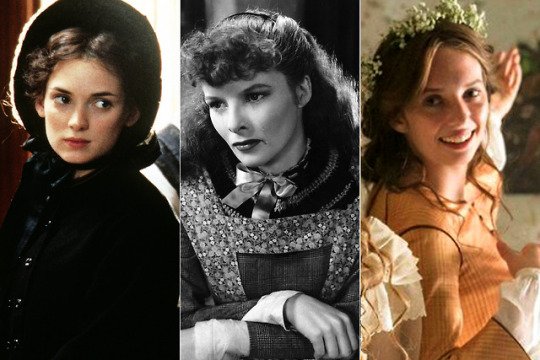
So, you want to adapt Little Women for the screen.
There’s quite a challenge ahead of you, Gentle Readers.
Might I help get you started?
What, you might ask are my own bona fides in suggesting that I might have the right to hold forth on such a topic? Very well, I first read Little Women in 1983. The first of countless times I have read it. Actually, I collect copies of it, and buy interesting ones whenever I see them. I’ve seen more than a few adaptations of it.
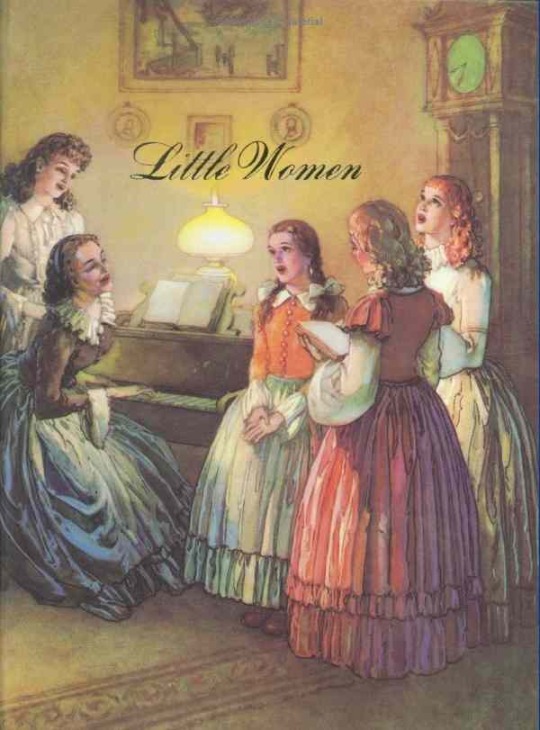
The cover of my first copy. A giant volume, it was highly impractical to carry around. I did it anyway.
An initial challenge, any screen writer will tell you, is sheer length. Little Women was originally published as two separate books. So, an initial novel, and a sequel. By 1880, the two volumes were forever published as one.
Not only does this mean lots of pages and plot needing weeded out of your script, but it also means you’re going to have two climaxes and two denouements (seems about right for a female novel, yeah?), another challenge when adapting the two stories into a single film. (Imagine having to create a single story/plot from Philosopher’s Stone AND Chamber of Secrets).
Inevitably, what generally happens in past adaptations is that Part II gets greatly compressed and short-changed (and I do not doubt, Gentle Readers, creates some of the dissatisfaction among viewers and fans where the handling of Laurie’s proposal and the latter adolescence of characters and their romances/mates don’t land as they might if spent more time with).
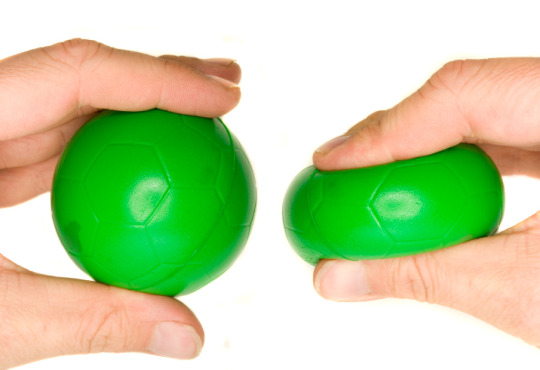
Actual illustration of Book One (on the left) and Book Two (on the right) once adapted for film.
According to Wikipedia: The book has been adapted for cinema; twice as silent film and four times with sound in 1933, 1949, 1978 and 1994. Six television series were made, including four by the BBC—1950, 1958, 1970, and 2017. Two anime series were made in Japan during the 1980s. A musical version opened on Broadway in 2005. An American opera version in 1998 has been performed internationally and filmed for broadcast on US television in 2001. Greta Gerwig is directing a new rendition of the novel, set to be released 2019.
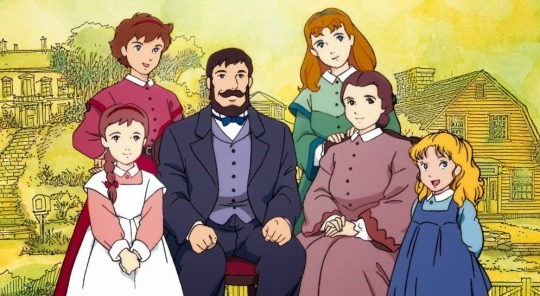
I could not hit “Add to Watchlist” fast enough.
So, the list of folks attempting to tackle Little Women is a long one, and not always a successful one. Some elements of the story are always going to play well, and frankly, be hard to mess up too much. But others? Others have some real sticking-points.
I’m not here to critique individual versions of adaptations today, Gentle Readers.
I’m just here to muse on the Big Questions that need solid answers when you’re ready to take on writing your adaptation.
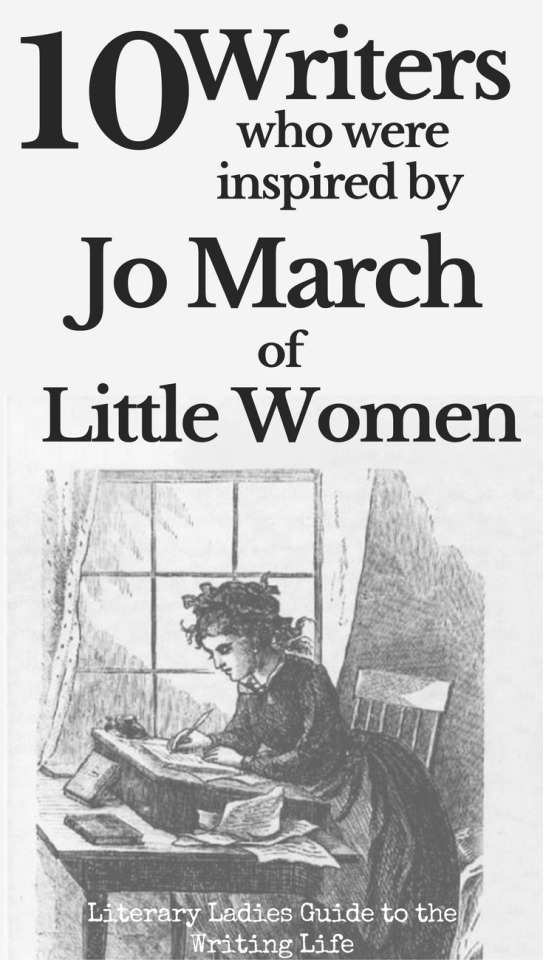
Someone contact them, I demand a recount.
1. How much of the true lives of the Alcott family will we include?
It’s no secret at this point that Alcott took a lot of inspiration from her real life. But how much do we include? Do we have Thoreau invited over for dinner? Do we address some of the more radical notions of the Alcotts’? Do we just go ahead and make Father in the novel like Bronson in real life?
a. How to explain/not explain the war and its effect on their lives
For contemporary audiences and readers, the incredibly matter-of-factness of the Civil War taking place deep in the background of the story will not resonate as much as it would to readers back in the day (It plays a bit like the Blitz in The Lion, the Witch, and the Wardrobe]. Perhaps it might be a good idea to bring it closer to the fore, beyond merely showing the girls in hoops, and coming across the occasional newspaper story or quietly dropped reference to a battle.
b. How to address or not address the March’s contemporarily confusing socio-economic position (that of ‘genteel penury’)
Gentle people now in reduced circumstances is a tough sell intellectually when 2019 can allow most everyone to disguise their financial situation through extensive credit and things like those housing bubble mortgages given to lots of Americans. It’s going to be necessary at some point to explain or show how the Marchs, who have so little themselves, have (to our 2019-eyes) pretty clothes, a large, cozy house, the ability to take food and minister to the (much) poor(er) Hummels, and a house servant; Hannah. The humiliating fact that they can’t buy new gloves for a party does not...exactly track in the twenty-first century.
They’re much worse-off than the Bennets of Longbourne, whose financial crisis is on the horizon, but how can you show that to viewers unfamiliar with the notion of life as a fallen-from-wealth family?
2. The persistent problematic-ness of Amy/Laurie
I will call to mind one adaptation, here, and Kirsten Dunst’s performance in particular. Singlehandedly, at the age of only *10*, she manages to sell the potential of not only Amy, but Amy/Laurie like no one else this tumblerian has ever seen. What a tragedy the film couldn’t have waited for her to grow up enough to also play Amy in the film’s second half.
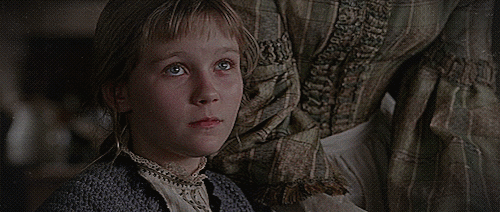
In a world where perfect casting is rarely obtainable, this child should have been nominated for Oscar. She out-performs every Amy March before or since, ad infinitum.
Like many of the romantic partnerships, which other than Jo/Teddy (which is not presented as romantic in Book One) are included only in Book Two, films front-loaded with Book One (I can’t think of one I’ve seen that wasn’t) find themselves racing to a conclusion, and every one of the three couples suffers in presentation and allowing enough time for viewers to be ‘courted’ by them into liking them.
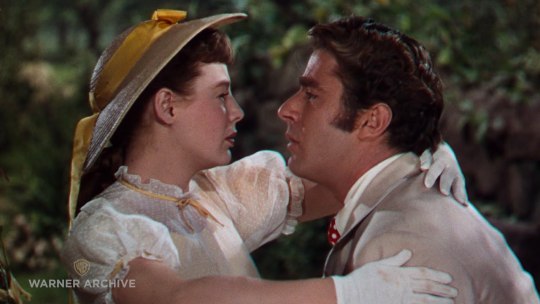
There’s simply not enough time left to work on all of them. So, it becomes a decision of which one is more important. Traditionally, as Brooke/Meg happens first, they get some character beats, but once Jo turns down Teddy...
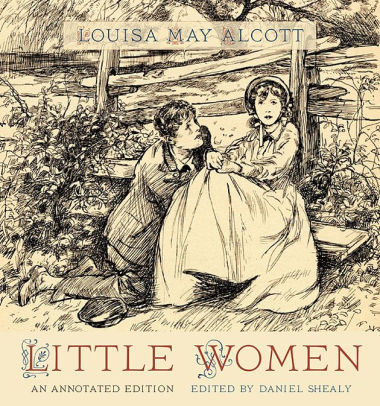
I can hear the screams of horror across the ages.
...adaptations become a fight between showing Amy/Laurie or Jo/Bhaer, yet both of which are true surprises to viewers not familiar with the story, and who need time to warm up and be seduced by these new pairings.
(Mind you, I do think Bhaer and Jo should sneak up on a viewer/reader, but there still have to be signs planted here and there that make it make sense when it actually does happen.)
3. The age and age progression of the girls
Per the book, the story begins with Meg 16, Jo 15, Beth 13, and Amy 12 (aside: poor Marmee).
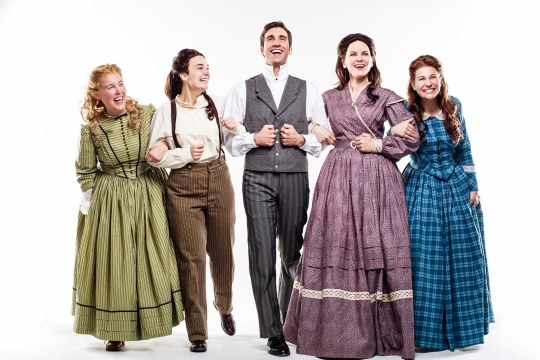
A clear example of...impractical* casting for teenagers. (And Jo! In trousers!?)
* but perhaps necessary for community theatre
As I mentioned a few lines ago, Amy becomes the most difficult to cast, here, as it’s unlikely a person can play both 12 and the age of Amy when she accepts Laurie. Amy may be only 16 or so when she accepts Laurie, but contemporary viewers are probably going to need a little more assurance she’s not a child bride by her looking more mature than 16.
Beth is frequently cast older, which is also troublesome. She’s 16 at most when she dies, and has been ill for some time. (So, easy to assume she wasn’t growing rapidly.)
Jo has to be able to play age 15 to 25+.
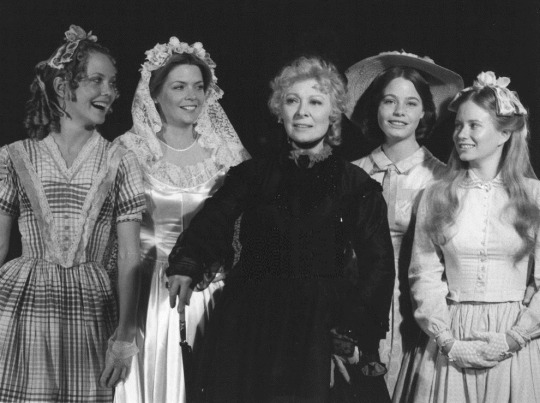
Is that meant to be Jo on the left? Does that make Susan Dey Amy?
Anyway, this production has the luxury of doing better on the ages of the girls. And they’ve got the inimitable Greer Garson as Aunt March!
Actors chosen can’t only be made-up to pass for certain ages, they also have to convince us they’re playing dress-up in the garret in the early portion of the film.
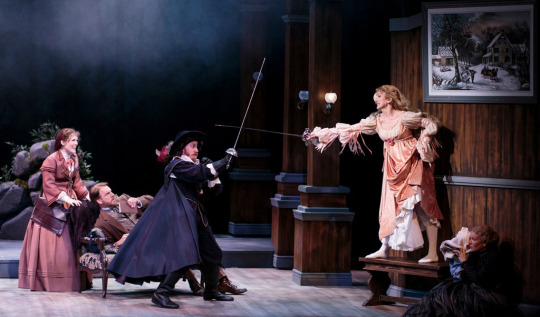
In fact, Jo in particular with her harum-scarum ways isn’t deliberately trying to make constant mistakes and faux pas. She’s a kid who hasn’t yet grown up, with a kid’s energy and unbridled sincerity. Convince us of that.
4. How to show both the importance and the growth of Jo’s writing
Filming someone writing is rarely moving to watch, and what’s more, writing is so misunderstood as a pastime or even a vocation, it doesn’t easily lend itself to being captivating when shown on-screen. And yet Jo’s writing is not only vital to the story, the growth and expression she finds in it are so deeply important to her character, and later to her romance plot with Bhaer. It’s got to be shown, and more than once. Moreso, or at least as much so as her temper, her mouth, and her lioness-like care for her sisters, it IS who she is.
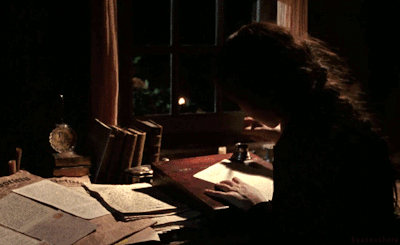
Where’s the silly hat?
5. Flawed female characters that are meant to confront and wrestle with those flaws
Well, this is a big one, here. It seems to me we’re sort of operating by 2019 where that old saw of [man] girl vs. self isn’t really written about or shown. Our society at large has become very vocal about whoever we are being awesome and “never change”.
Which is just about as far from the notions in Little Women as one could get. Every one of the ‘women’ has something they need to work on, to grow and improve about themselves. From Meg not being able to get over their loss of money and status (remembered from when she was younger), to Amy’s dissatisfaction and constant desire to fine things, to Beth’s introversion, to Jo’s temper and intolerance of those who aren’t as bold and rebellious against society as her, and Jo’s inability to accept the change that will constantly be coming into all their lives as they grow.
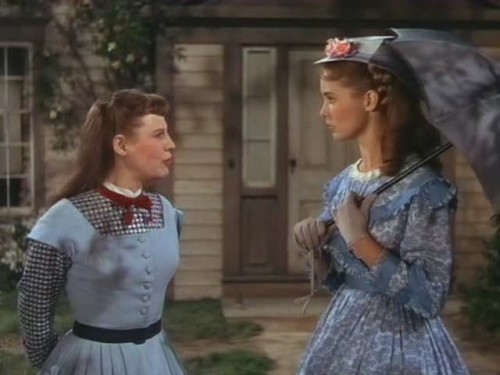
Nasty!
The Little Women Alcott wrote had lessons to learn, and directions to grow, contrary to what their gut reactions might be. You can call that a moralistic take on the novel, but you can’t argue that Jo has to change, and is expected to be her own instigator of that change within the novel(s). [It does seem like anymore in films that the only person we expect to change bad habits or wrong ways of being are actual ‘bad guys’/villains. And sometimes not even them.]
6. Friedrich Bhaer
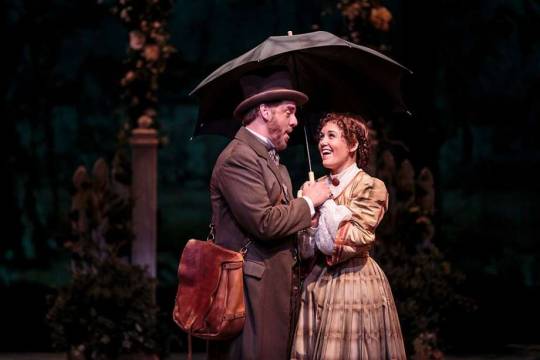
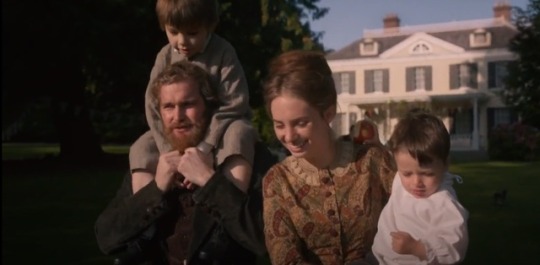
Well, that’s a mouthful. I don’t doubt that it always has been. The single, fan-dividing phrase of female literature. Am I right?
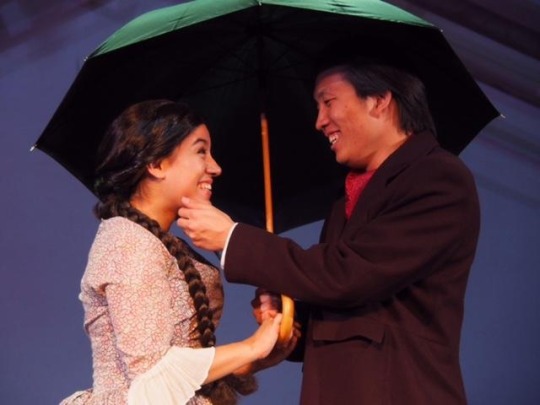
Doing for umbrella representation until Gene Kelly came along.
You know the story, right? That Alcott was so DONE with readers after Book One assuming and expecting Jo and Teddy to live happily ever after, she was so frustrated (she had never wanted, nor intended for that to happen) with all the shipping she built a Bhaer bomb.
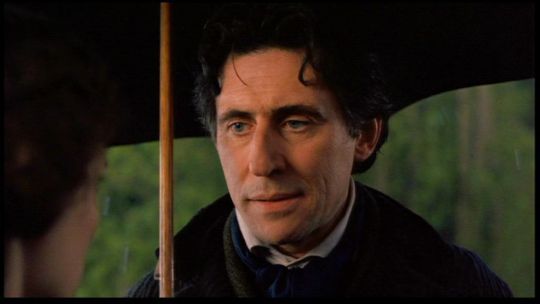
@grrlinthefireplace would climb that.
And it’s still exploding readers’ and viewers’ minds today.
Why Professor Bhaer is the perfect match for Jo, and why their marriage and life together makes ultimate sense is certainly a post for another time, but I will say that if you’re still sore about it, take some time and reread the book as an adult, and see if you don’t also come to see the eminent sense in it.
That said, in any satisfying and successful adaptation, you’ve got to work hard to sell the man your heroine chooses over Laurie. Laurie’s had all of Book One and a good three-quarters of Book Two to endear himself to readers. Who’s this guy?
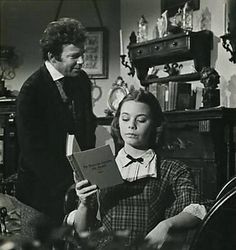
Well, yes, that’s William Shatner...as Professor Bhaer.
This guy isn’t good enough for Jo. This is nonsense. “Weird old guy with an uncomfortable age gap with my fave.” Are not the sort of things you’re going to want to read in reviews.
First, you’ve got to cast him right. Hollywood’s not *overly* worried about distressing RL gaps in ages between their actresses and actors, you might know, and beards are actually pretty in right now. Bhaer’s not a babe by any means, but he’s got an accent he can work. And he’s in love with our fave.
Think an Alan Rickman-type (I know he’s not German), did you see how hot Kurt Russell made Santa Claus in that Netflix Christmas movie? Jeff Bridges, Pierce Brosnan? Probably all too old.
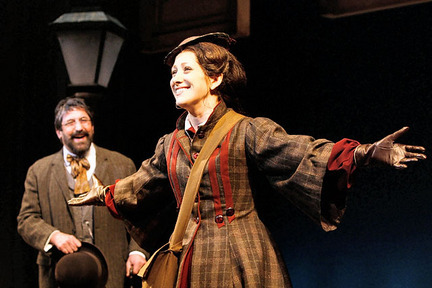
Bhaer’s actually described as “middle-aged”, which means 40ish, to Jo’s 25 (when she accepts him). You know who’s 40ish in Hollywood? Gerard Butler, Hugh Jackman, Ewan McGregor, most of Hollywood’s Chrises, RDJ for Pete’s sake is 53. Give him a beard, and awkward social presence tick, and get him working on that accent, and I guarantee your audience will buy Jo’s attraction to him, and create a Twitter for his umbrella.
In the end, Bhaer is key to understanding that the novel isn’t trying to transform Jo into a woman who will fit into Teddy’s wealthy life and the social circles he has no plans to turn his back on. Bhaer is literally the embodiment of Jo making choices that she learns (and I daresay we are meant to learn) are right for her. She finds a man comfortable with who she is, who is in love with her brain as much as with the rest of her, who sees their coupling as a joint project, and who wants her to be the best her. (cough, cough, Gilbert Blythe prototype)
You’ve got to get him right, or what’s come before gets lost in dissatisfaction for Jo’s final, epic choice.
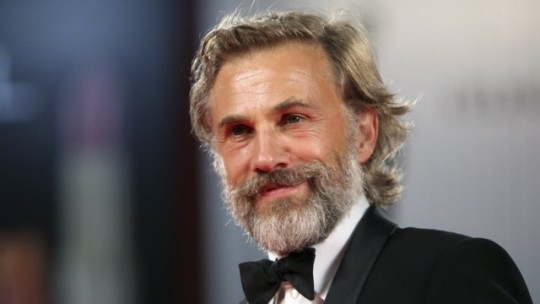
Oh, look, a nice picture of a charismatic, bearded German actor. How did that get here?
Let’s be succinct here in the end, Gentle Reader. Little Women (Books One and Two) and Little Men and Jo’s Boys would make a splendid series. (Such as Anne with an E), there’s certainly enough episodic drama and plot to go around.
Keep that in mind when planning out your adaptation.
What film adaptation is your favorite, and why?
106 notes
·
View notes